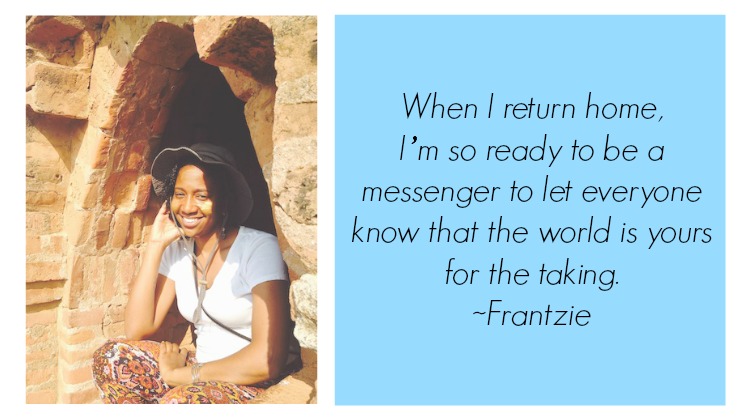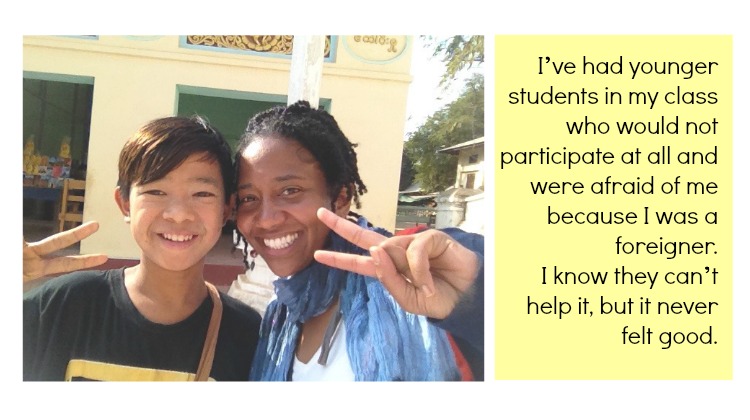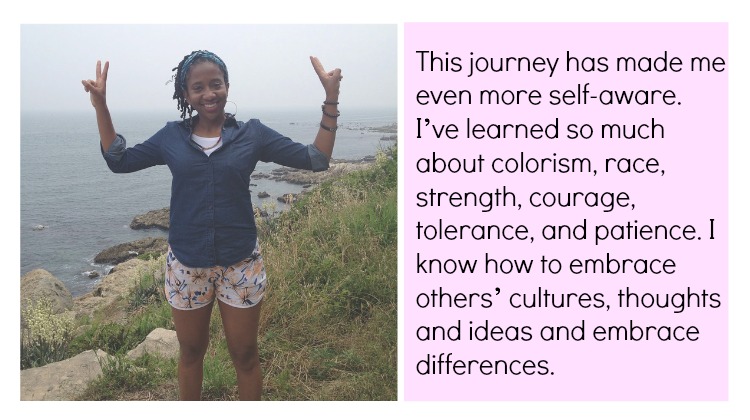I talk a lot about traveling on this blog. A LOT! I mean after all this is a website devoted to the art of travel. The fabulous places to visit, sights to see, and incredible people you will meet. However I’ve only briefly touched on what I like to coin as the Ugly Side of Travel. Today’s expat interviewee shares a candid reflection on life in Vietnam.
You won’t read many travel sites that actually give you the real deal about life in a foreign country as an expat or tourist. You hardly see writers depicting honest accounts of the racism you may experience abroad as a black solo female traveler. Or the panic & anxiety of having to carefully maneuver around groups of hungry seedy eyed men in a restless mining. Or realizing that those stories that you read on blogs or in travel magazines that romanticize the journey are just that…stories!
Ok let me be clear…YES…the journey is different for everyone. But it’s time we start to really share the truth about the obstacles that we (travelers) endure when we put ourselves out there in discovery of a new place. Travel moves you, breaks you at the core, and shakes up your spirit to new beliefs about your identity and personal life philosophies you never knew existed within you.
I spent the past nine months cultivating a book that explores how to deal with the effects of the Ugly Side of Travel. And what to do when the experience leaves you jaded.
It’s real!
About 2 years ago now I connected with a young woman via Instagram that stepped outside life in NYC to go travel and teach in South Korea! Little did I know then, how much we would have in common with regards to our journey around South Korea and Vietnam. Of course I couldn’t let the opportunity go by to feature her expat interview on this site:)
Frantzie is such a beautiful spirit and I truly admire her solid perseverance through difficult days during her time in Viet Nam. I hope this interview inspires (and doesn’t deter) those who read it to take a leap and explore the unknown.
Because I honestly believe that continuing to travel and visiting places still treading in the past when it comes to their ideals of back America(ns), is the only why to erase the ignorance.
Frantzie also gives really great advice on questions you should ask yourself before embarking on your journey. I suggest you write them down and answer them, truthfully, in a notebook if you are considering moving abroad.
~~~
Please introduce yourself.
My name is Frantzie, from New York, and currently teaching English abroad in Asia. I’m a fearful adventurer, I love travel, and I love New York City.
Why did you decide to move abroad to Asia?
I dreamed that I would move to Asia to become a digital nomad. I’ve never been good at finishing things that I started. Instead, I looked into teaching English in possibly Thailand to sustain a life overseas. It seemed like a great idea, but after more research, I found that you could make even more money teaching English in South Korea. Inspired by my wanderlust and my debts, Korea seemed like a place where I could have it all – travel and financial freedom. I’m currently living in Vietnam.
How do you self identify?
A Black woman – Haitian American.
As a black Haitian American expat what advice would you give to others inspired to live abroad?
Get clear about what you want from your journey abroad. Do you want to live abroad, travel extensively, or stay in a place for a few months at a time? I never asked myself those questions before leaving for South Korea. I often find myself wishing I was in New York City, my home, because it will always be a better fit for me culturally. If I spent 30 days in South Korea rather than a year, I could have a higher appreciation for it. It pains me to say it, but I hated living there.
Can you afford to live in your host country? France inspired my wanderlust. I wanted to live in Paris. But, I didn’t think that I could afford to live in Paris. I chose Asia. South Korea. Vietnam. The way my story unfolds is that Asia turned out to be a wrong fit.
Do your research on significant cultural differences between where you live and the country you are considering. Besides things like table etiquette and greetings, how does your host country respond to foreigners? Are certain human rights issues important to you? Where does your host country stand on some of these issues? I was born in the United States and I’m accustomed to my country’s brand of crap. But, can you handle another country’s brand of crap? Enough to make you want to live there permanently? Find out what working there is like. Living in a foreign country and working and living in a foreign country are very different.
Find a support system before you move to your host country. Connect with local expats before you arrive. Don’t be afraid to make e-friends. Join travel forums. Once you arrive, you’ll already have people to connect with.
What are some of the most challenging things you’ve had to deal with while abroad? How do you overcome them?
Moving overseas doesn’t guarantee a dramatic positive transformation. Sometimes, it can have the opposite effect. In 2012, I took a 30-day trip to Paris, France. My friends could not stop sharing how radiant the experience made me. I seemed more adventurous, romantic, and loving. Exactly what the books say Paris will do to you.
I moved to Daegu, South Korea in 2014. After one month, I felt like my light had been stolen. I experienced depression. I left Korea and it was only when I was back in the States that I returned to what felt like my normal self. But, I had no idea I was depressed. I wanted to give my experience a second chance. I hopped on a plane in 2015 to Ho Chi Minh City, Vietnam. The same negative feelings that I felt in Korea resurfaced within a month of living and working in Vietnam.
One of my biggest challenges has been admitting the frustration and resentment that I feel living in these two countries. I tried to keep my feelings mute so that I didn’t come across bitter, privileged or cynical. There are many times that I wish I never made this journey to Asia. I wonder, why can’t I love Korea or Vietnam? I want to be positive and share how awesome the countries are, but I don’t feel that way. Saying, it’s different, no longer rings true for me. I just don’t like it. I often struggle with my guilt for not liking it, but you don’t have to like it. No one ever expects to dislike a country (or talks about it) they chose to move to, but it happens.
My second biggest challenge has been understanding that racism, bigotry, and self-hate is inescapable-and a global issue. Racism is subtle and covert in Asia compared to the U.S. Aside from the stares and picture taking that come from being considered exotic in Asia, as a Black woman, also comes the negative stereotypes about people with darker skin. For me, they started with casual comments.
You’re not Black. Black people are dark. Black men have big d*cks. Blacks are quite aggressive. I love your skin color, not too dark. How can you be from America?
The derogatory comments and warnings about people from Africa.
Be careful. A lot of Nigerians are there.
Asia has its own issues with colorism. But, some will tell you that it doesn’t exist. There’s a white advantage in Asia. White expats from Europe, South Africa, Australia, etc. weren’t exempt from sharing these comments.
Living in a developing country was like living in Africa.
Because I’m from the United States, many shared that I should be used to racism. I’ve been told that racism in Asia is not what I think. It’s a legitimate ignorance. They just don’t know. I can’t say anymore if it’s a legitimate ignorance when I discovered the inner racism among other Asians. I’ve heard inappropriate jokes about darker skinned Southeast Asians or Japanese culture.
I never got used to the subtle micro aggressions.
Another real problem for me is that my politics and values don’t fit to what Asia’s seem to be. I silently grumble when I hear a Vietnamese woman pining to raise a family with a white foreigner because “mixed babies look better.” Fair and white skin is prettier. Homophobia remains prevalent. My students make fun of gays all the time. Transphobic terms like “lady boy” are used regularly. I don’t have the authority to change or teach tolerance in my classrooms in Asia.
I’ve had a very, very hard time adjusting in Asia from the first month to going on two years to the “saving face” culture that guides daily life here. Oftentimes, mistakes happen and someone just says, sorry, without making the effort to resolve it. Can you just accept the mistake anyway because no one wants to look wrong?
I haven’t overcome any of these challenges. I grew tired of playing a game of respectability politics because I was a guest in a foreign country. Some things that helped me cope with my host country and helped me enormously were doing research.
Blacks living in Asia. How to Cope When You Hate Your Host Country. Racism Among People of the Same Cultural Group.
I searched for people who had the same experiences. I was honest, vulnerable, and asked for help. I found expats who could share my experiences without spending time bitching about how much we hated our host countries. I made a tremendous effort to stay connected with friends and family in the U.S. so I didn’t lose myself. Living overseas can be an isolating experience. When people don’t know who you are to the core and don’t like your packaging, it can be a very frustrating experience when you’re sharing your truth. I’d been told I was self-defeating, negative, a reverse racist, behaving like a victim, a joy stealer, a complainer, or just wasn’t making enough effort to fit in and learn more about the cultures. But, I refused to be silenced because this was my authentic story abroad to share.
Instead of pushing my frustrations to the back of my mind and getting over it or making it work when it just wasn’t working, I thought this was an important story to share. I began writing about it. I opened up on Facebook about it even when the comments weren’t so friendly. It felt like my pain was everyone’s entertainment. Some of the incidents were funny, although offensive. It was a cathartic release.
It’s easy to get stuck in a revolving mindset and compare your host country to that of your home country. I balance my frustrations with those comforting moments like seeing my Korean middle-schooler get excited when I showcased The Brooklyn Academy of Music’s Dance Africa Festival. When I bend over to check my students’ workbook, they tug my curls.
Teacher, it’s so bouncy.
I’ve met incredible and understanding people both Asian and foreigners who have allowed me to express myself and that’s helped me incredibly.
I’m hardly an expert on Asian culture, but this is my point of view based on my experiences living, working and travelling throughout Asia. I don’t think my home country is any better, but what helped me the most is realizing that I have to choose my poison.
How would you compare your experience living in South Korea to living in Vietnam?
As far as teaching English in Korea versus Vietnam, Korea is still one of the best places to teach English in Asia. The salary is higher and the national healthcare system is great. Albeit two distinct cultures, my experience in Korea and Vietnam are the same. In Vietnam, I have a lot of free time due to teaching at a language center versus a public school like I did in Korea. I’m free most mornings and afternoons and work a full weekend schedule. English is prevalent in Ho Chi Minh City. Ho Chi Minh City is a fast-paced and chaotic city compared to Daegu, South Korea. South Korea has some of the cheapest and best public transportation. It’s more calm, but it gets incredibly cold in the winter. South Korea is more green and the pollution there didn’t affect me as much as it does in Ho Chi Minh City. In Ho Chi Minh City, the sun shines everyday, the food is delicious, and I have access to some of the most exotic fruits for under $2. Unfortunately, for me, both countries have been disappointing experiences living abroad.
When teaching others about your culture, what is the most important message you want them to take away?
The big attractions of a culture don’t encapsulate it. Just like it’s wrong for Americans to only associate Vietnam with the Vietnam War or South Korea with the Korean War or perpetuate stereotypes about Asian culture, it’s also to wrong have misconceptions about American culture. Some of the biggest misconceptions I’ve heard are that Americans eat hamburgers and french fries, are rude, talk very fast, promiscuous, Blacks and whites don’t get along and we all are from New York or California. Some of these things could be true for some people, but that’s not all of us. Diversity is what makes America so unique and I would love to share that. I would love to have conversations where we could drop the assumptions about one another.
When I lived in Asia I realized that the local’s idea of “beauty” also played a role in how I was treated as a Black female. Be it exclamations of fear because I am rocking a head scarf, how I was approached by Korean men, the stereotypes and assumptions to even the blatant staring. It was an interesting life experience to say the least. Have you experienced anything similar?
I’ve definitely had these kinds of experiences living in Asia. The staring comes with the territory. Adults have giggled at my hair.
It looks strange, is something my colleagues have said to me. One of my co workers asked me if my head wrap was a hijab. Another whispered to me that it could frighten people. I fell ill one day and my peers told me that it was because my head wrap was too heavy, stopping the circulation in my head.
Men have approached me thinking I offered sex for money. I’ve received comments disguised as compliments that I just didn’t look as dark as most Black people. That made me beautiful. I’ve definitely rocked a head wrap to shouts of Nigeria! Africa!
I’ve had younger students in my class who would not participate at all and were afraid of me because I was a foreigner. I know they can’t help it, but it never felt good.
Sometimes, the experiences can be hurtful even if someone doesn’t realize how the message comes across. It’s a lesson in tolerance and acceptance for me. You can’t change other people’s cultures, beliefs, or behavior whether we think they are ignorant or wrong.
How will you use your travel experiences to help those who you inspire to travel?
When I first had the idea of moving abroad, my wanderlust was the only thing that guided me. Instagram, Facebook and travel blogs with pictures of Vietnam and Korea. I only listened to the good stories. Who loved it here because I assumed that was going to be my story, too? I used to say that my negative experiences abroad haven’t served me. I compromised my spirit and I was very unhappy. But, they actually did serve me.
It was such an isolating feeling when I couldn’t find people who could understand what I was going through. I hope my stories, interviews, and just talking to friends can prepare people on how to deal with the dark and ugly side of being an expat or travel. It’s not something you even think about. These experiences affected my heart and my mind and no one ever talks about it because it makes people uncomfortable. No one likes a negative story.
This journey has made me even more self-aware. I’ve learned so much about colorism, race, strength courage, tolerance, and patience. I know how to embrace others’ cultures, thoughts and ideas and embrace differences.
If anyone has had the negative story abroad that I have, don’t be so hard on yourself. No country is perfect and no country is perfect for everyone. The rest of the world is there for you to explore.
It’s through the talks that I’ve had with you, I’ve realized that I’m literally changing minds while being here. When I return home, I’m so ready to be a messenger to let everyone know that the world is yours for the taking.
Thanks again Frantzie for doing this interview and reflecting on your time in Vietnam! I truly believe this is one of the most candid stories ever featured. You inspire me and I know you will inspire many readers as well!
If you have a question, comment, or would like to get in touch with Frantzie, please leave a comment below!
Thanks 🙂



Very inspiring and thought provoking interview, “traveling while black” is a topic that hasn’t garnered enough Facebook/travel blog posts. I appreciate your candid yet un-jaded responses. It gives one a new perspective on possible experiences while abroad.
Thank you for checking out Frantzie’s story. It was very candid indeed!